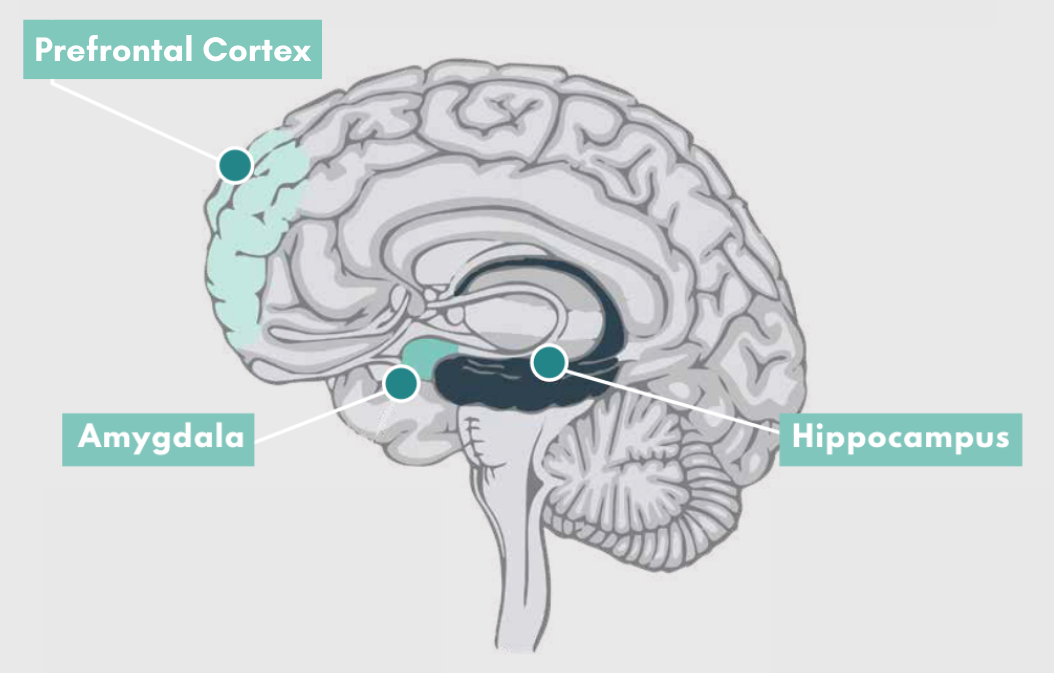Trauma and How it Effects the Brain
Sexual violence can have psychological, emotional, and physical impacts on a survivor. Understanding how trauma impacts the brain can help survivors understand their own responses to trauma and have more knowledge about what they are experiencing. There are three parts of the brain that are impacted by trauma the Prefrontal Cortex, the Amygdala, and the Hippocampus.

Prefrontal Cortex
- Also known as the regulation of emotion center
- Responsible for organizing, planning, prioritizing; maintaining focus; understanding different points of view; emotion-regulation; self-monitoring; rational thinking; decision making; and personality
Amygdala
- Also known as the fear center
- Responsible for receiving all the information from your surroundings (what you see, hear, smell, taste, and touch) and answers one question, “is there a threat?”
- Sends out a danger signal if a threat is perceived (initiating a fight or flight response)
Hippocampus
- Also known as the memory center or thinking center
- Connects and organizes different aspects of memory
- Responsible for locating an event in its proper time, place, and context
Three Ways Trauma Effects Brain Function
1. The Amygdala (fear center) is Overactive
The overactive amygdala is hyperalert, even to non-threatening stimuli, and can perceive threat everywhere. That is why you may find yourself feeling unsafe or afraid in an environment that is actually safe or nonthreatening.
The perception of feeling threatened or unsafe activates the fight, flight, or freeze system; causing involuntary physiological changes that happen in the body and mind that tell the body to prepare for danger in different ways.
A person in fight or flight may experience tense muscles and feel extremely alert. They may feel agitated, confrontational, or like they need to leave a room or location. A severe fight or flight response can become a panic attack. While a person who is “frozen” may be extremely alert, they are also unable to move or take action against the danger and may experience physical immobility, a drop in heart rate, and muscle tension.
2. The Hippocampus (thinking center) is Underactive
The underactive hippocampus experiences difficulty piecing together memories, differentiating from past and present, and integrating memories of experiences with facts and feelings.
- This may manifest in a form of intrusive memories and flashbacks.
- Triggering memories provoke the Amygdala reinforcing its hyperactivity.
3. The Prefrontal Cortex (emotion regulation center) is Underactive
Because the prefrontal cortex is underactive, it is less able to override the hippocampus as it flashes fragments of intrusive memories. The hippocampus is also less able to signal to the amygdala that you are safe and that there is no actual threat. This leads to the underactive prefrontal cortex becoming overwhelmed and less able to regulate emotion and engage in executive functioning tasks.
Let Your Body Know You Are Safe
Understanding these brain functions doesn’t stop negative reactions from happening but there are ways you can let your brain and body know you are safe.
- Take slow deep breaths
- Pay attention to what you see, smell, taste, hear, and touch
- Tell someone how you feel
- Talk to yourself and remind your Prefrontal Cortex (emotion regulation center) that it is just your Amygdala (fear center) taking over.
If you are a survivor of sexual violence, you are not alone. Lotus provides support and advocacy services to individuals of all ages who have been impacted by sexual abuse or assault. Advocates help survivors and their loved ones define needs, explore options, understand reactions, and strengthen coping skills. Learn more about the Neurobiological Impact of Trauma on the Brain and how Lotus can help you heal and grow after trauma.








